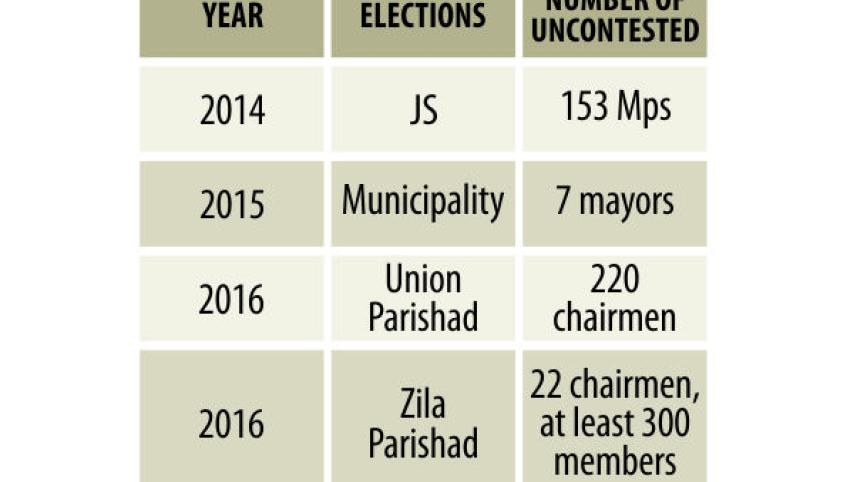A new model of elections

Uncontested elections - be it national or local - is gradually becoming a common practice in Bangladesh politics.
The January 2014 parliamentary polls bears the distinction of being an unprecedented event where 153 out of 300 MPs were elected unopposed. This was unprecedented in the history of parliamentary democracy in the world. This was a case where the majority in the parliament was determined without a single vote being cast.
This trend has become all too regular in the subsequent elections to local government bodies without any break for the last three years.
More than 200 candidates, almost all of them belonging to the ruling party, were elected uncontested in elections to upazila parishads in 2014, municipalities in 2015 and union parishads in 2016.
The first ever zila parishad election is the latest testimony of this practice. Twenty-two out of 61 chairmen and around one fourth of the members were elected unopposed.
No previous polls were replete with such huge number of uncontested elections to parliament and local government bodies. In the past, such uncontested polls took place after certain pauses but since January 2014, the phenomenon has become the order of the day.
For example, until the January 5, 2014 parliamentary election, the highest number of MPs elected unopposed was in the one-sided parliamentary elections on February 15, 1996. As many as 49 MPs were elected unopposed then. But the uncontested elections of 153 MPs in January 5 polls surpassed all past records.
Previously, only 11 MPs were elected unopposed in the 1973 election after independence when AL was riding high on the patriotic tide immediately after the Liberation War. Its leader Bangabandhu Sheikh Mujibur Rahman was the undisputed leader of Bangladesh. No other party had the audacity to challenge the AL in the battle of ballots.
In the second parliamentary elections held in 1979 during Gen Ziaur Rahman led martial law regime, 11 MPs were elected uncontested. AL was still reeling from the August 15, 1975 bloody changeover and the party was in disarray.
The number of elected uncontested MPs rose to 18 in the 1988 parliamentary election which was held during the autocratic Ershad regime amid a boycott by AL, BNP and other political parties.
But none was elected unopposed in 1986 parliamentary election in which AL and some other parties had contested even though it was held under the second martial law regime led by Gen Ershad.
Not a single MP was elected unopposed in four other contested elections held after the restoration of democracy in 1991, in June 1996, 2001, and 2008.
Uncontested elections in the last Union Parishads elections also surpassed all past records. In the last elections held in between March to May, 220 chairmen were elected unopposed. The number was 34 in 2003 polls, 37 in 1997, 4 in 1992 and 100 in 1988 elections.
Seven mayors were elected unopposed in the last municipality elections held in 2015. In the Upazila Parishad elections in 2014, some candidates to the vice chairman post were also elected unopposed.
The uncontested elections actually mean voters are denied of their constitutional rights to vote.
Such elections contradict the spirit of the Universal Declaration of Human Rights of 1948 and our constitution.
Article 21 (3) of the UDHR unequivocally says that the will of the people shall be the basis of the authority of the government; this will shall be expressed in periodic and genuine elections which shall be by universal and equal suffrage and shall be held by secret vote or by equivalent free voting procedures.
International Covenant on Civil and Political Rights adopted by the UN General Assembly in December 1966 also stressed the need for free and fair elections.
Articles 65 and 59 of the constitution empower people to elect MPs and local government representatives by exercising their franchise.
But uncontested elections demolish the above provisions. It is unique to have this new model of elections in our electoral democracy to deny people's voting right.
If this continues, people will keep loosing their voices in state affairs. The emphatic pronouncement by the constitution that all powers of the Republic belong to the people will remain only in the book and people will remain powerless in reality.




 For all latest news, follow The Daily Star's Google News channel.
For all latest news, follow The Daily Star's Google News channel.
Comments